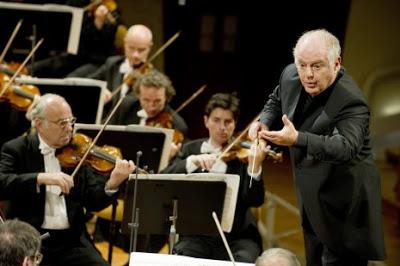Daniel Barenboim and the Berlin Staatskapelle at Carnegie Hall.
by Paul J. Pelkonen
Daniel Barenboim conducts the Berlin Staatskapelle.
Photo © 2016 Accentus Music and the Berlin Staatskapelle.
Bruckner was an Austrian composer who ranks among the great composers of the 19th century. A fervent Catholic, he built monumental symphonies on a cathedral-like scale, inspired by the late works of Beethoven. Some of these are huge pieces, with the Fifth and Eighth well over an hour each. All travel an upward path in a search for redemption and revelation, finding final expression in choirs of brass and a surging sea of strings.
This is the first time that Carnegie Hall has presented a cycle of Bruckner symphonies, playing each of these great works in chronological order. The opening First ("The Saucy Maid") shows the composer's folk influences, which stayed with him all the way up to the triptych of the Seventh, Eighth and Ninth. The Ninth was unfinished at the composer's death, and will be performed in its traditional "torso" form of three movements.
Bruckner is challenging music. The symphonies are all four movements (with the exception of the Ninth) and follow the plan of the classical symphony. There is a huge Sonata Allegro, a slow movement (that can last almost 30 minutes in some cases) a stomping, rustic Scherzo and a grand finale that Beethoven-like resolves the thematic questions of the first three movements while making its own contribution to the musical argument. These works can be ponderous, and require the hand of a master conductor.
Each of the shorter symphonies will be paired with the piano concertos of Wolfgang Amadeus Mozart, with Mr. Barenboim conducting from the keyboard. Mozart wrote these works for himself to perform, and they contain some of that composer's most fervent, lyric and heroic writing for the combination of piano and orchestra. In their ambition, they are a good match for Bruckner, although the two composers created their art by very different means.
The schedule is as follows:
Jan. 19: Mozart: Piano Concerto No. 27; Bruckner: Symphony No. 1 ("The Saucy Maid")
Jan. 20: Mozart: Piano Concerto No. 20; Bruckner: Symphony No. 2 ("Symphony of Pauses")
Jan. 21: Mozart: Piano Concerto No. 24; Bruckner: Symphony No. 3 ("Wagner")
Jan. 23: Mozart: Piano Concerto No. 26 ("Coronation") ; Bruckner: Symphony No. 4 ("Romantic")
Jan. 24: Mozart: Sinfonia concertante; Bruckner: Symphony No. 5 ("Tragic")
Jan. 25: Mozart: Piano Concerto No. 22 ; Bruckner: Symphony No. 6 ("Philosopher")
Jan. 27: Mozart: Sinfonia concertante; Bruckner: Symphony No. 7 ("Lyric")
Jan. 28: Bruckner: Symphony No. 8 ("Apocalyptic")
Jan. 23: Mozart: Piano Concerto No. 23 ; Bruckner: Symphony No. 9 ("Den Lieber Gott")
In 1954 when he was 11 years old, the Argentina-born Mr. Barenboim met Wilhelm Furtwängler, the legendary German conductor. The young pianist was described as a "phenomenon" by the elder maestro, who became Mr. Barenboim's hero and mentor. In the 1970s, Mr. Barenboim became one of the first conductors to record Bruckner's symphonies complete with the Chicago Symphony Orchestra. He would repeat the feat twice, with the Berlin Philharmonic and more recently with the Staatskapelle, where he holds the post of Principal Conductor for Life.


